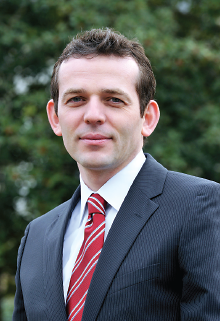Psychiatrists Have Role to Play in Risk Communication
Abstract
Psychiatrists can care for communities by understanding the need for and tools of thoughtful risk communication after disasters.
Last year’s Ebola outbreak may have tapered off but the lessons learned from the epidemic that sickened more than 28,000 and claimed the lives of 11,000 continue to extend from the villages of West Africa to the streets of New York City, Sander Koyfman, M.D., the medical director for behavioral health at EmblemHealth in New York told an audience gathered at IPS: The Mental Health Services Conference in October.

It can take a long time for a community to recover from a disaster, but psychiatrists have the skills to reduce anxiety among individuals and populations, says Sander Koyfman, M.D., president of Disaster Psychiatry Outreach.
In West Africa, the Ebola outbreak was a long, slow disaster, perpetuated by a health infrastructure hobbled by poverty, said Koyfman, who is also the president of Disaster Psychiatry Outreach, an organization of volunteer psychiatrists who offer education and training in mental health following disasters.
“The damage done by Ebola is hard to reverse,” Koyfman added, but it was further complicated by the fact that those in the communities hit hardest by the virus did not trust the government’s recommendations regarding how to stop the spread of the virus.
Even in the United States, where just 11 cases of Ebola and two fatalities were reported, some criticized the Centers for Disease Control and Prevention’s response to the outbreak, according to Koyfman: “[The agency] was seen as too slow to respond, too muddled in its recommendations, and too mixed in its messages.”
Koyfman suggested that such failures may have contributed to the media frenzy that followed the news in October 2014 that Craig Spencer, M.D., a doctor who had returned to New York after treating patients with Ebola in Africa, was hospitalized with an elevated temperature.
“Now there is no actual danger to anyone else until the patient is fully symptomatic, but that didn’t keep politicians from calling Spencer ‘irresponsible’ and demanding quarantine orders for all travelers from West Africa,” Koyfman said. “Here was one person in one isolation room in one facility, and news coverage was frenetic.”
Politicians and the news media called for scrubbing down the New York City subways where Spencer had traveled while asymptomatic. A bowling alley where he played after returning from his time in West Africa swabbed out bowling balls to allay fears.
The overwrought political and media reactions did not match the medical reality, said Koyfman. That division was replicated in the hospital where Spencer was treated. Some staff members volunteered to care for him while others shunned those who did so.
Anger and fear can cloud an individual’s ability to accurately assess risk, said Koyfman. But, psychiatrists can help such individuals and communities following disaster by creating a safe environment and encouraging calming, connectedness, coping skills, and hope. Working with the media can also help to relay accurate messages of risk, but should be done only by those with media training to avoid misinterpretation, he said.
In fact, there is a science—or certainly a well-developed art—to risk communication, added Grant Brenner, M.D., a psychiatrist in private practice in New York.
“Much of risk communication is about trust and credibility, not about data,” said Brenner, the author of Irrelationship: How We Use Dysfunctional Relationships to Hide From Intimacy (Central Recovery Press, 2015).
Even so, many of the basic questions likely to be asked by the media or people affected by a disaster can be anticipated in advance, making it possible for experts to gather facts and rehearse what to say and how to say it, said Brenner. “Anticipation, preparation, and practice are key.” ■
A first-person account of Craig Spencer’s experience with Ebola can be accessed here.



